I admired and enjoyed Bill Condon’s Kinsey (Fox Searchlight, 11.12) upon seeing it Monday night. It’s a smart, probing, movingly performed portrait of what it was like to live in sexually suppressed times, and how a startling work of research by an gangly odd-duck scientist named Alfred Kinsey (Liam Neeson) began to lift the cloak of sexual puritanism.
I’ve just made it sound like one of those plodding, dutiful, good-for-you biopics. It’s not. It’s alert and focused and keeps you thinking and re-thinking.
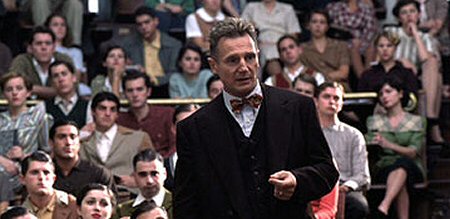
Neeson hasn’t been this concentrated and affecting since Schindler’s List (and this time without any “forgive me!” breakdown scenes). Costar Laura Linney, as Kinsey’s plucky wife Clara, delivers yet another perfectly-tuned performance. And John Lithgow’s acting as Kinsey’s constipated pathetic prick of a father sneaks up and touches you in a third-act scene — you go from hating the bastard to feeling compassion in one surprisingly swift stroke.
Kinsey is even a howl at times, and I’m surprised that the Toronto Film Festival reviews I read didn’t mention this more. It’s not a comedy, but when the laughs come they’re uproarious.
< ?php include ('/home/hollyw9/public_html/wired'); ?>
I’ve been asking myself whether this curious but undeniably intriguing story about what Kinsey went through in the 1940s and early `50s in delivering two culturally convulsive best-sellers about human sexual behavior (“Sexual Behavior in the Human Male” and “Sexual Behavior in the Human Female”) is going to touch people where they live, or at least make them care about Neeson’s heroic character.
As Caleb Crain’s Times article observed last weekend, “Not everyone applauds [Kinsey’s] accomplishment,” adding that there are those who “revile him as a fraud whose `junk science’ legitimized degeneracy.” There may be some people in the more conservative quarters of this country who will recoil slightly from the film, being of the belief that Kinsey helped bring about far-too-liberal attitudes about sexual matters in general, thus hastening the grim slide into the swamp.

But aren’t most of these people living in underground bunkers and old-age homes? Is there anyone with any advanced education or moderate sophistication who still feels queasy about sexual candor?
We live in an era, after all, in which a previous U.S. President found comic infamy a few years back as the recipient of an Oval Office blowjob. In which Kitty Kelley has reported that Dubya may have had extra-marital episodes. In which Vice President Cheney’s daughter is an uncloseted lesbian.
The U.S. is still a somewhat prudish nation in some respects, certainly compared to European folk, but isn’t every libidinal stirring known to man pretty much out on the media table these days? When a Kansas conservative like Bob Dole jokingly refers to being a Viagra man, you know sexual constipation levels aren’t what they used to be.
Feeling It
I caught Taylor Hackford’s Ray (Universal, 10.29) on Tuesday night, and the talk is not overblown: Jamie Foxx’s performance as the legendary Ray Charles totally, righteously kills. This is the exact sort of tour de force thing that always seems to hit a bulls-eye with the Academy. I almost said to myself, “This is it…he’s got the Best Actor Oscar.”
Then I reconsidered. This race isn’t over. Not with Paul Giamatti’s doleful sad-sack performance in Sideways kicking ass. The more I think about the moody dance that his lonely, pissed-off junior high-school teacher goes through, looking for love and struggling with a troubled novel, the more affecting it seems, especially given the quality of Alexander Payne’s film.
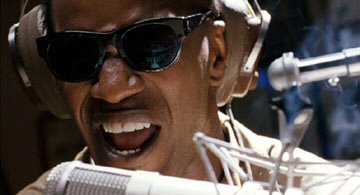
If you want to be provincial and small-minded about it, and I’m sorry to be passing these thoughts along, but the other apparent contenders have this or that strike against them.
Javier Bardem is moving and dignified in The Sea Inside, but the film is a bit too enamoured with the nothingness of death. Liam Neeson in Kinsey gives a beautifully measured performance, but a view that the real-life Kinsey was a bit of a perv gained a certain legitimacy from a piece that ran in last Sunday’s New York Times. Kevin Bacon’s acting in The Woodsman is top-drawer, but the sexual deviancy element is probably going to give some people pause.
I think these guys have all done superb work, but I (think I) know how Academy types tend to size things up.
The fact is that Foxx’s performance, which carries sensitivity and grace but also impresses because it’s a superb impersonation piece, is the only one that conveys that positive uplift theme (a gifted man is beset and nearly undone by his demons, but eventually overcomes them) that always seems to strike a chord.
I’ll get into the film itself down the road, but it’s clearly a foot-tapping, highly charged thing and pretty much impossible to resist. Hackford has assembled a right-down-the-middle biopic in most respects. It isn’t a Martin Scorsese or a Paul Thomas Anderson film. It more or less just tells a life story, albeit with rhythm and feeling.
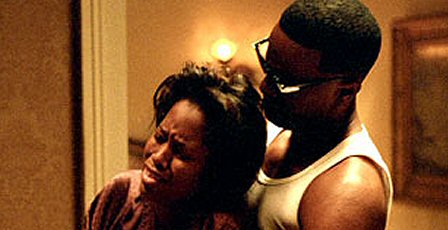
Sometimes a ball thrown straight across the plate is okay. Not every pitch has to be a curve or a slider or a knuckleball.
I also agree on some level with David Poland’s view that Ray runs a bit too long. To be fair, I’ve spoken to others about this and I seem to be in the minority. The odd thing is that I’ve thought it over a few times since last night and I can’t really figure what should have been cut. Maybe it needed a thousand tiny cuts. All I know is, I was feeling one of those Harry Cohn ass-twitchings during the last 20 to 30 minutes.
A friend of the film, responding to this concern, wrote the following on Wednesday morning: “I’d encourage you to see it again, despite of (or maybe because of?) its length. I have found that on my second and third viewings, my appreciation for how delicately Hackford feathers the drama and the music really grew. Now that you know the beats and the arc, you can really sit back and enjoy some of the finer filmmaking points.”
Recruiting
I’ve made this point before, but in trying like hell to fill Hollywood Elsewhere with all kinds of new columns and sidebars and whatnot, I’ve overlooked a logistical fact or two.
One, I can’t do everything, even at the pace I’ve been keeping (work days starting at 7 am and lasting until midnight or so, with time-outs for screenings). I can handle two weekly columns, the WIRED items, arranging for weekly DISPATCHES pieces from filmmakers, and editing and composing the regular contributor columns.
And two, I need more skilled contributors living on trust funds to pitch in and fill things out. The longer I do this, the more I realize that the appeal of Hollywood Elsewhere isn’t just about me and my big mouth, but a whole community of spirited film lovers — people who know how to write and need to be heard and ought to be heard.
I need some more people to send in VISITORS articles, interview transcripts that can go into VERBATIM, and writers who want to bang out DVD reviews for DISCLAND. Plus I need someone willing to do some grunt layout work with articles from time to time.
Squared Away
The Castle Keep DVD brouhaha is officially over, soothed and rectified.
Earlier this week I received a handsome widescreen version of Sydney Pollack’s 1969 anti-war film, and I have no complaints. Everyone can now dismiss from memory the pan-and-scan version released in August by Columbia TriStar Home Video. Unless, of course, CTHV president Ben Feingold approves the issuing of more pan-and-scan versions of widescreen films.
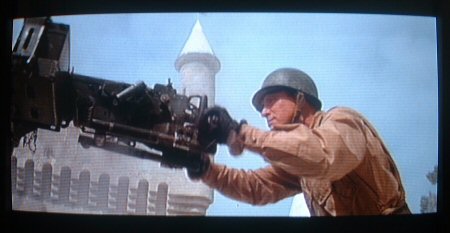
The hurried release of the widescreen version, due on 11.2, happened in response to an angry letter written sometime in mid-August by Steven Spielberg, George Lucas and Martin Scorcese to Sony vice-chairman Jeff Blake. The letter “raised hell” about the Castle Keep pan-and-scan transferring, according to an insider who read it. Blake passed the letter along to Sony honcho Michael Lynton, who in turn conveyed his concerns about negative p.r. to Feingold.
The Spielberg-Lucas-Scorsese letter also complained about a pair of Three Stooges DVDs released last August that offered colorized versions of four Stooges shorts, along with black-and-white versions. No word on what response, if any, CTHV had on the Stooges.
Rahoi’s Rant
Hollywood Elsewhere art director Jon Rahoi sent me the following last weekend about his experience with Ladder 49, the Disney-produced firefighter movie with John Travolta and Joaquin Pheonix:
“I usually give movies the benefit of the doubt,” he began. “I almost always leave the theater saying something nice or focusing on what I liked. It helps to be picky about what you see, but even so during the show I’m a forgiving viewer. It’s not until much later that any criticism works its way out.
“So imagine my surprise when, during the middle of Ladder 49, I actually thought about walking out. The last time this happened, Alec Baldwin was bombing Japan with Ben Affleck. You know how fun it is to be at a party where everyone else is drunk except you? Others in the theatre were laughing, sighing, and letting go with a sniffle or two. And there I was, the designated driver.
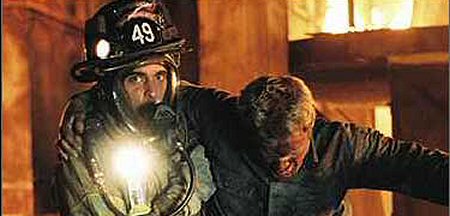
“My Cheese Detector beeped in the first few minutes, but it wasn’t off the charts. There were cardboard characters, jovial male-bonding scenes set to music, the “tell my wife I love her” scene, past footage of a beloved character freezing into a black-and-white photo scene, and even the obligatory get-hold-of-yourselves-after-a-devastating-tragedy scene.
“I know some firefighters, and most of them talk about how little they work. They talk about the pay, the benefits and the pension. That’s why most of them get into it in the first place. These are guys who were middle-of-the-roaders in school. Maybe they were athletes, maybe they got into it when that Business Admin degree was looking like less of a sure thing. They’re not haunted, and they’re not idealistic heroes living to help all. I respect them, but certainly don’t see them as heroic. It’s a job. They’re working just hard enough to avoid the axe, like every other schmuck in the western world.
“Every man in this crap movie is a hero. None of them do anything remotely human, except for the token aging asshole character cheating on his wife, the token father figure sharing how he chose his job over his wife, and the token black guy saying he didn’t want his kids to see him burned because “this is something kids don’t forget.” Who are these guys? If you want realistic firefighters, watch Rescue Me on F/X.
“Joaquin Phoenix lives with another hero-movie staple, the wet-blanket woman. Whether it’s Adrian in the Rocky movies, Aretha Franklin in The Blues Brothers, Diane Keaton in Godfather II or Gretchen Mol in Rounders, the wet-blanket woman is there to throw salt in the hero’s game, upping the personal stakes on his quest for glory.

“Pheonix’s wife (Jacinda Barrett) fights his longing to be a hero and urges him to take a safer job. I’m a father and a husband, and there’s no way I could fight off constant `you’re putting yourself in unnecessary danger’ scorn for ten years. And why would I want to? First of all, it’s not fair to the spouse — marriage is a partnership, not a sidebar to a career. It’s not like Baltimore needs him and only him.
“The wet-blanket woman character is based on a mistaken assumption, which is that a hero needs to listen only to his internal compass, and that his closest friends and family couldn’t possibly have anything important or informed to say about his situation. Because a man has to go his own way.
“What does it say about us that we cheer this attitude? We will our heroes into acting irrationally for the same reasons Earl gave Tiger a putter at 3 years, and why Jon Benet Ramsey wore makeup — we feel like failures. So instead of being happy with life, we force others to succeed for us.
“This movie could not have been made before 9/11. It’s a FDNY suckfest — they’re not fooling anyone by setting it in Baltimore. And just as movies in the late ’70s and ’80s paid hamhanded tribute to the fallen in Vietnam, it looks like we’re in for a rough few years of movies about the war on terror.
“Maybe some people will say I’m unpatriotic or an unfeeling ass. But how heroic is it to take stupid risks to the eternal chafe of your soulmate, and to eventually leave your wife and two kids to fend for themselves?
“‘Yes, Daddy’s a hero. Now look really sad when you hold up the cardboard sign.'”
Alleged Commie
“My wife and I both felt the same way you seem to regarding Janet Leigh’s performance in The Manchurian Candidate until we happened to read an article airing the theory Leigh’s Eugenie Rose is a Communist agent assigned to keep watch over Frank Sinatra’s character.
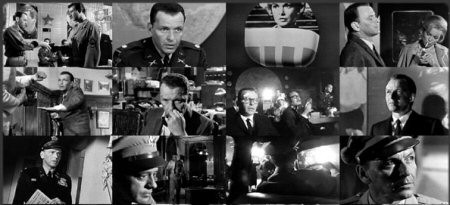
“That odd conversation she has with him on the train is used as an example of her taking control over him by her use of words (just as a card and words are used to control Laurence Harvey). This explains why he goes immediately to her apartment, as well as some of the reaction shots of Leigh’s face when Sinatra is telling her what is going on. Her expression is particularly chilling during their last encounter near the end of the film.
“Anyway, I cannot say if this idea is right or wrong, but when we watched the film recently with this thought in mind, Leigh’s character worked much better for us.” — Wade Warshal.
Wells to Warshal: Yeah, I’ve heard that one. It doesn’t hold water or add up in the slightest in terms of what John Frankenheimer directed or George Axelrod wrote, but if the boat floats for you, fine.
